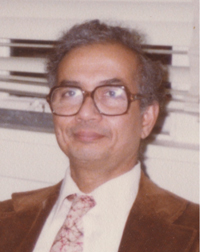Gopinath Kallianpur, distinguished probabilist, passed away on February 19, 2015. He was Alumni Distinguished Professor at University of North Carolina, Chapel Hill for nearly 25 years; Professor Emeritus since retirement. He is survived by his wife Krishna, daughters Asha and Kalpana, and granddaughters Yashwina and Kashmira.
Born in Mangalore, Karnataka on April 16, 1925, Kallianpur’s college education was in Trichy, Madras (now Tamilnadu). After teaching briefly in Mumbai at Wilson College, he moved to Chapel Hill for his PhD. Working in the field of stochastic processes with H. Robbins, he obtained his doctoral degree from Chapel Hill in 1951 for his work on the asymptotic behaviour of the occupation times of two dimensional Brownian paths, known as Kallianpur–Robbins law. His was one of the early theses in the then-emerging field of stochastic processes. He spent a year each at the University of California, Berkeley and the Institute of Advanced Studies, Princeton. Subsequently he was a faculty member at the Indian Statistical Institute (ISI) during 1953–56. Norbert Wiener visited ISI during this period and Kallianpur interacted with him extensively on prediction theory. This manifested later in fundamental work on non-linear filtering theory. In the 1960s, while at the University of Minnesota, Minneapolis, the Kallianpur–Striebel formula was obtained. This provides the solution to a class of important filtering problems in the form of an integral on a suitable function space, and plays a key role in the further development of the theory. This work used, for the first time, Itô’s theory of stochastic integration and the Girsanov formula.
He showed, along with M. Fujisaki and H. Kunita, that under suitable conditions, the non-linear filter satisfies an appropriate stochastic differential equation (SDE). An important special case was also derived independently by H. Kushner. These equations have come to be known as the Fujisaki–Kallianpur–Kunita (FKK) equations. The SDE of the non-linear filter is one of the first naturally arising examples of an SDE governing an infinite dimensional process.
The problem of characterizing the filter as the unique solution to the FKK (or other) equations was open for about 20 years. Kallianpur (with Abhay Bhatt and R. L. Karandikar) obtained the characterization in a very general framework using the formulation of Martingale problems. They also used the Kallianpur–Striebel formula to prove that the nonlinear filter is robust.
The classical theory of filtering that uses stochastic calculus is elegant, mathematically appealing and has provided enormous stimulus to the theory of SDE’s. Using the concept of a Gaussian cylindrical measure on Hilbert spaces, Kallianpur, with R. L. Karandikar, developed a theory of white noise, rich enough to incorporate filtering theory and derived analogues of various results of the classical theory which culminated in the book White Noise Theory of Prediction, Filtering and Smoothing.
Inspired by R.A. Fisher’s lectures at the ISI, Kallianpur and C.R. Rao introduced the concept of Fisher Consistency in the theory of statistical estimation. Kallianpur considered several other aspects of statistical estimation, like optimality properties of regular Bayes estimators, limiting distributions of Von Mises statistical functionals, asymptotic distributions of V-statistics, and estimating a two-dimensional area using line grid method. This latter work actually goes back to his stay at the ISI in the early 1950s and has its origins in ISI’s crop-cutting experiments.
He returned to ISI as its Director during 1976–78 and worked relentlessly, making significant contributions to the academic and administrative functioning of the Institute. He founded the Bangalore centre of ISI.
In 1979 he was appointed Alumni Distinguished Professor at the University of North Carolina at Chapel Hill. Assisted by M.R. Leadbetter and S. Cambanis, he set up a Center for Stochastic Processes at Chapel Hill. This center provided an important avenue for significant interaction among faculty, students and a large number of distinguished visitors from all over the world, which contributed towards substantial research in the general area of stochastic processes.
Throughout his career, Kallianpur was very active in serving the scientific profession in various capacities. He served on the editorial boards of several international journals and on committees of professional societies He was a Fellow of the IMS and the Indian National Science Academy (INSA); a member of the International Statistical Institute; he was Kolomogorov Professor (1996) of Moscow State University.
Kallianpur was a man with a sharp wit and a passion for research and learning. He was knowledgeable on world history, politics, Indian archaeology, Buddhism, Hinduism, and the western literary classics, and he was interested in music—Indian as well as western classical.
Written by B.V. Rao, Adjunct Professor,
and Rajeeva L. Karandikar, Director,
both from Chennai Mathematical Institute

Comments on “Obituary: Gopinath Kallianpur, 1925–2015”